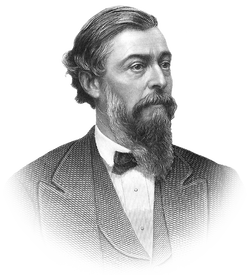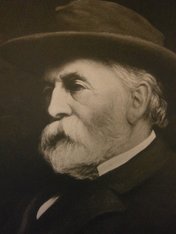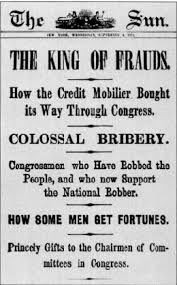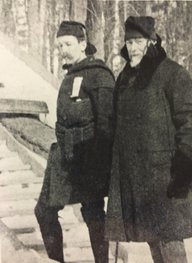 Dr. T.C. Durant. Source: Wikimedia.
Dr. T.C. Durant. Source: Wikimedia.  Collis P. Huntington
Collis P. Huntington His lavish spending back home in New York was also legendary. A biographical piece in the New York Tribune in 1869 reports he frequently entertained people on his yacht Idler at the New York Yacht Club.
I have seen him entertain a party of ladies and gentlemen upon it, for the entire forenoon as if he had not a care in the world beyond the comfort of his guests. And at one o’clock say nonchalantly: “Well good-bye, I must go ashore. I have a million dollars to pay before three o’clock. Have your sail out and don’t return until you are ready.”
The Tribune had other flattering things to say about Doc Durant, including that he worked as hard as a galley slave.
There were times he could not have told whether the next turn of the wheel would make him or lose him a million dollars but the great work never flagged.
When the Transcontinental Railroad was officially complete with the joining of Central Pacific and Union Pacific lines at Promontory Summit, Utah in 1869, Durant turned his attention east where he owned a substantial amount of land. In the 1860s forests cut over and abandoned by lumber companies in the Adirondack Mountains of New York State were being sold off at tax sales for a mere five cents an acre. Durant instructed his lawyers to attend the sales and managed to accumulate over ½ million acres. The land was tax free as long as Durant promised to build a railroad and make infrastructure improvements. But by the financial panic of 1873, an economic depression left Durant land rich and cash poor, and he was having a hard time finding investors.

 William and Thomas Durant, Circa 1884. Source: Winterthur Museum
William and Thomas Durant, Circa 1884. Source: Winterthur Museum They were successful in bringing a line from Saratoga to North Creek, NY but never to Canada and when Doc Durant died in 1885 he left his family without a will and creditors looking for their pay-out. There were several lawsuits against Doc Durant from former investors in both the Transcontinental and Adirondack Railway Company. William was left to unravel his father’s unscrupulous and tangled financial dealings as well as a railroad company in disrepair and major debt.
What the Adirondack Railway Company did have however was land, and lots of it. It was around this time that Collis P. Huntington, befriended his old enemy’s son, becoming a board member of the Adirondack Railway Company. His business acumen and advice must have been welcomed by William who never questioned Huntington’s motives. Using questionable business practices that would have made his father proud, William managed to sell off the Railway Company but keep most of the land. Ironically, Huntington’s influence over William may have led to his undoing. But in the end, it was William’s sister Ella who sued William for an accounting of the family fortune and brought to public light the family legacy of unscrupulous business dealings.
Find out more about the fictional lives of the Durants in the Durant Family Saga by Sheila Myers.
 RSS Feed
RSS Feed
